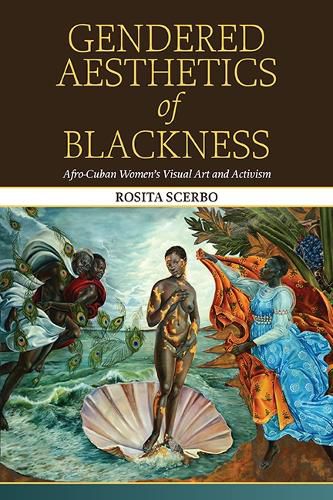Readings Newsletter
Become a Readings Member to make your shopping experience even easier.
Sign in or sign up for free!
You’re not far away from qualifying for FREE standard shipping within Australia
You’ve qualified for FREE standard shipping within Australia
The cart is loading…






Explores how Afro-Cuban women's visual art challenges dominant narratives of race, gender, and identity.
Gendered Aesthetics of Blackness delves deeply into the visual artistry and activism of Afro-Cuban women in Cuba and the United States. Influential in their communities yet overlooked in the mainstream art world and academic discourse, Harmonia Rosales, Maria Magdalena Campos-Pons, Belkis Ayon, and Susana Pilar practice what Rosita Scerbo calls "Decolonial AfroARTivism." These women use their art to challenge and disrupt dominant narratives, reclaim their identities and cultural heritage, and advocate for social justice. In centering their voices and meticulously analyzing their works, Scerbo not only enriches our understanding of Afro-Cuban visual culture but also pushes the boundaries of research. Groundbreaking in its decolonial approach and form, Gendered Aesthetics of Blackness engages a wide swath of sources and includes two interviews, with Rosales and with curator and popular educator Diarenis Calderon Tartabull.
$9.00 standard shipping within Australia
FREE standard shipping within Australia for orders over $100.00
Express & International shipping calculated at checkout
Explores how Afro-Cuban women's visual art challenges dominant narratives of race, gender, and identity.
Gendered Aesthetics of Blackness delves deeply into the visual artistry and activism of Afro-Cuban women in Cuba and the United States. Influential in their communities yet overlooked in the mainstream art world and academic discourse, Harmonia Rosales, Maria Magdalena Campos-Pons, Belkis Ayon, and Susana Pilar practice what Rosita Scerbo calls "Decolonial AfroARTivism." These women use their art to challenge and disrupt dominant narratives, reclaim their identities and cultural heritage, and advocate for social justice. In centering their voices and meticulously analyzing their works, Scerbo not only enriches our understanding of Afro-Cuban visual culture but also pushes the boundaries of research. Groundbreaking in its decolonial approach and form, Gendered Aesthetics of Blackness engages a wide swath of sources and includes two interviews, with Rosales and with curator and popular educator Diarenis Calderon Tartabull.